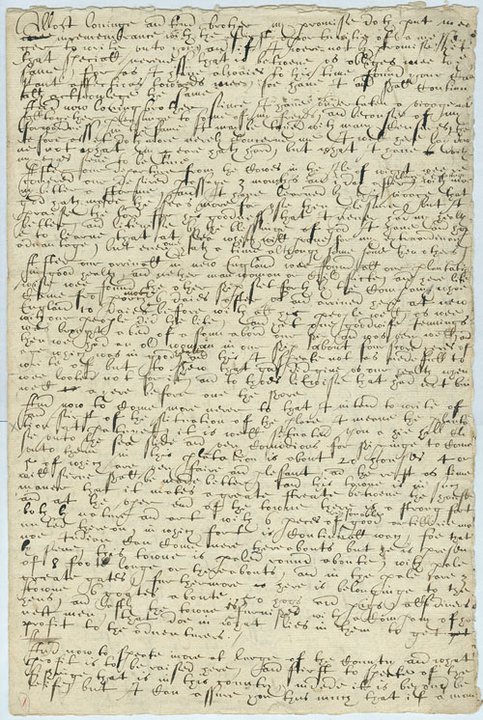Some of the earliest surviving descriptions of Plymouth Plantation are in the letters of Emanuel Altham.
Captain of the Little James, Altham made two voyages to New England between 1623 and 1625, and his letters provide lengthy accounts of the "Company of Adventurers" and their rugged outpost. In this 1623 letter, Altham describes the plantation at Pautext: "It is well situated upon a high hill close unto the seaside ... In this plantation is about twenty houses, four or five of which are very fair and pleasant."

Altham's first letter from New England describes the plantation at Pautext and surrounding country. MA 3200.1
He further discusses New England’s natural resources in great detail, describing the "healthfulness of the air," the woods, the fishing available, and the great stores of game surrounding the plantation: “Here are eagles of many sorts, pigeons, innumerable turkeys, geese, swans, duck, teal, partridge divers sorts, and many other fowl, that one man at six shoots hath killed 400.”
But these letters are not all jovial Pilgrims and first Thanksgivings -- they also touch on the complicated relationship of the Pilgrims with the Wampanoag people and the strained workings of the Company financing the colony. Altham describes the goodness of the "great emperor" Massasoit and notes that he is "as proper a man as was ever seen in this country, and very courageous," but he also alludes to the fact that it is not only "peace and friendship" between the English and Americans: the plantation is surrounded by an 8-foot high fence and the fort is stocked with six pieces of "reasonable good artillery." And he notes in a later letter that although the natural abundance of New England is great, the poor running of the plantation and the lack of support from the Company in England caused the plantation to falter. By 1624, financial loss and internal power struggles nearly led the Company to withdraw all support and abandon the pilgrims, and Altham repeatedly accuses them of not understanding what supplies are necessary for life in New England.
After two voyages, Altham had had enough -- as he could "do no thinge worthy" in America, he sought other adventures, and spent the last years of his short life as an officer in the East India Company.

These letters are all to Altham's brother. This typical 17th-century address reads: "To my Honorable Brother Sr Edward Altham knight, dwellinge at Marke Hall in Essex in Laton. Inquire for Sr. Edward Latham at ye signe of ye Starr in Pauls church yard: a woolyndrapers shop right against ye south dore of ye Church, of one Mr. Ralph Hawtry, and he will direct you as afore desired, London, Pr my good frend Mr. Collison whome God preserve." MA 3200.9
For more information about this collection, click here.
The Leon Levy Foundation is generously underwriting a major project to upgrade catalog records for the Morgan's collection of literary and historical manuscripts. The project is the most substantive effort to date to improve primary research information on a portion of this large and highly important collection.
